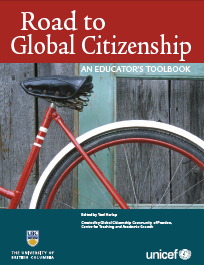 In this toolbook we see global citizenship education as an approach to teaching and learning, not an addition to the curriculum. Approaches to education that create global citizens can be engrained in the core of any learning environment, in any degree program, course or curriculum. Our working definition of a global citizen is someone who feels a duty to respect and protect the Earth, the global community of fellow human beings and all other living creatures. We envision global citizens as individuals who have developed an understanding of the interconnected world and who deeply appreciate and value ecological sustainability and social justice. Global citizens are individuals who are willing and enabled to take action to make the world a fairer place for ourselves and other living creatures.
In this toolbook we see global citizenship education as an approach to teaching and learning, not an addition to the curriculum. Approaches to education that create global citizens can be engrained in the core of any learning environment, in any degree program, course or curriculum. Our working definition of a global citizen is someone who feels a duty to respect and protect the Earth, the global community of fellow human beings and all other living creatures. We envision global citizens as individuals who have developed an understanding of the interconnected world and who deeply appreciate and value ecological sustainability and social justice. Global citizens are individuals who are willing and enabled to take action to make the world a fairer place for ourselves and other living creatures.
The key elements in developing global citizenship include:
• knowledge and understanding
• cognitive, social and practical skills
• dispositions (values and attitudes)
Our approach to fostering global citizenship in higher education settings helps us think about how to design programs, courses, lessons and activities that incorporate the key elements of global citizenship
in Table 1 to make sure that our teaching offers opportunities:
(a) To develop global literacy (an understanding of the generic themes) about the wider world: students will develop the knowledge and awareness of the interdependent relationship among individuals, societies and the environment; and the impact of personal, social and economic choices;
(b)To participate in a community of inquiry: students will develop the skills and dispositions to engage in dialogue that is caring (supportive of all participants), creative (encouraging of new ideas), critical (rigorous in requesting evidence to support ideas) and open to correction (acknowledging fallibility);
(c)To foster individual agency and collective action: students will develop the skills and dispositions needed to identify problems, strategies, and solutions for challenging local and global inequities and suffering, and promoting the ecological sustainability and social justice required for the well-being of all.
Throughout the toolbook we will return to both the key elements of global citizenship and to
the three-pronged approach to fostering global citizenship education that has been
articulated.